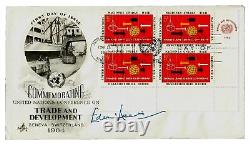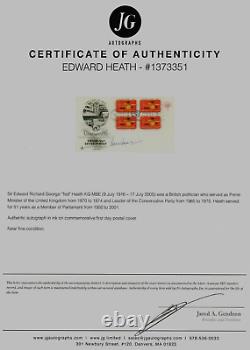British Prime Minister Edward Heath Hand Signed FDC From 1964 JG Autographs




This item is certified authentic by. And comes with their Letter of Authenticity. Sir Edward Richard George Heath.
(9 July 1916 - 17 July 2005) was. Prime Minister of the United Kingdom. From 1970 to 1974 and. Leader of the Conservative Party.
Heath served for 51 years as a. Outside politics, Heath was also a world-class.Born the child of a carpenter and a lady's maid, Heath was educated at a. And became a leader within student politics while studying at the. He served as an officer in the. He worked briefly in the. But resigned in order to stand for Parliament, and was elected for.
He was promoted to become. In 1955, and in 1959 was appointed to the. He later held the role of. And in 1963, was made.
President of the Board of Trade. After the Conservatives were defeated at the. As Leader of the Conservative Party in 1965, becoming. Although he led the Conservatives to a landslide defeat at the.
He remained in the leadership, and at the. Led his party to an unexpected victory.During his time as Prime Minister, Heath oversaw the. In 1971, and in 1972 he led the reformation of. Local government in the United Kingdom. Significantly reducing the number of local authorities and creating a number of new metropolitan counties, much of which remains to this day. Perhaps Heath's most prominent achievement came in 1973, when he led the United Kingdom into membership of the.
Which would later become the. Heath had always been a strong supporter of British membership of the EC, and after winning the decisive vote in the. By 356 to 244 to join, he led the negotiations that culminated in the UK's. Heath regarded this as his personal "finest hour". Heath's time as Prime Minister also coincided with the height of.
And subsequent suspension of the. Seeing the imposition of direct British rule. Delegates were unsuccessful, as was the.
Of 1973, which led the MPs of the. To withdraw from the Conservative whip. Heath also tried to reform British trade unionism with the.
And hoped to deregulate the economy and make a transfer from. However, a miners' strike at the start of 1974 severely damaged the Government, causing the implementation of the. Attempting to resolve the situation, Heath called an. For February 1974, attempting to obtain a mandate to face down the miners' wage demands, but this instead resulted in a.With the Conservatives losing their majority. Despite gaining fewer votes, the Labour Party won four more seats, and Heath resigned as Prime Minister on 4 March after talks with the. To form a coalition government were unsuccessful. In October 1974, he Heath insisted he would continue as leader, but in January 1975.
For the leadership, and on 4 February, she narrowly outpolled him in the first round. Heath chose to resign the leadership rather than contest the second round. In 1975, he played a major role in the. On British membership of the EC, campaigning for the eventually successful "Yes" vote to remain in the Community. He would later become a severe critic of Thatcher during her time as Prime Minister, speaking and writing against the policies of.
Until his retirement in 2001. He died in 2005, aged 89. He is one of four British Prime Ministers never to have married.
He has been described as "the first working-class meritocrat" to become Conservative leader in "the party's modern history" and a. Tradition who rejected the laissez-faire capitalism that Thatcher would enthusiastically endorse.


